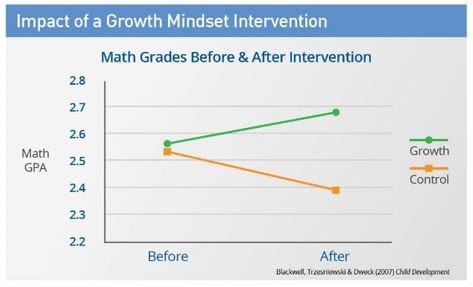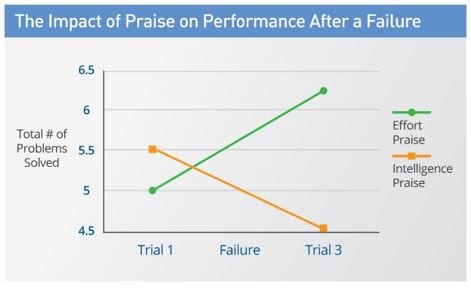A ‘growth mindset’ is the belief that abilities are developed over time, and any skill or area of knowledge can be developed with hard work and perseverance.

You could think of a fixed mindset as a self-fulfilling prophesy. A child who doesn’t believe they can improve at maths has that hanging over their head in every maths class. Alternately thinking they can learn new things and ‘grow’ (growth mindset) will see them approach new information and classes with an open mind and positive attitude, setting them up for success with that new content, which in turn will reinforce the belief that they can do it.
There is strong research to back up this theory. You can read more about it here or for a longer more in depth look, access to a book by Dr Dweck herself can be found here.
 The nutshell version;
The nutshell version;
Students were taught to hold a growth mindset for maths learning. Compared to the control group they showed a significant improvement in their actual maths ability over time. To read more about how to help students with maths in particular click here.
Growth mindset is also essential for high achievers, despite currently doing well in school these kids often show the strongest fixed mindsets of all. They have been taught to believe their smartness is inherent, rather than earnt through hard work. The tragedy is that eventually everyone faces challenges and without the belief that they can improve and the resilience a growth mindset gives, they crumble under pressure.
With a growth mindset, you believe that you can improve, not that you are ‘smart’ or ‘gifted’, and in fact regardless of what level you are at or what hurdles you face, you believe you can improve and overcome.

Students praised for hard work and effort (growth mindset) have been shown to persevere past failures, attempting more questions and showing more resilience than students praised on their intelligence levels alone (even if those students did better to begin with).
So, what can we do to help students adopt a growth mindset?
1. Change your language;
As teachers, parents, or tutors we need to consider the language we use. Are we building a growth mindset, or a fixed one?
Avoid any language that implies that skills, knowledge, and abilities are fixed.
Instead of | Try |
“You’re so smart” | “Great work!” |
“You are so good at science” | “Wow, you worked so well this year, great job!” |
Encourage children to change their own language and beliefs;
Instead of | Try |
“I’m just not a maths person” | “I haven’t learnt that maths yet” |
“I can’t do it” | “I can’t do it yet” |
2. Encourage mistakes
Making mistakes is not only fine, but essential to the learning process. It is so common to see students (and sadly commonly girls) unable to bounce back from mistakes, being their own harshest critics and seeing every perceived ‘failure’ as evidence that they just can’t do it.
Mistakes are part of the process of learning. It is normal to make mistakes, what makes someone ‘smart’ or good at a certain skill is only that they persisted through mistakes until they had mastered the skill!
3. Challenge your own beliefs;
The simplest change we can make is in our language, and our own attitudes. Children pick up on our true beliefs and behaviours. If they see you challenge yourself, make mistakes, recover and learn, they might just do the same. The language we use to describe ourselves and our own beliefs about our abilities is so important too. Remember, it’s not that I can’t do that, I just can’t do it YET.
It can be difficult to make this radical change in thought, or help a child to change their mindset, especially after experiencing failures in the past. However, it’s this radical shift we need to adopt in society and in education to enable the next generation of learners to hold strong growth mindsets – set to learn and grow for the future. To accomplish anything!

Mindset works have a great tool to think about and assess your own mindset right now, try it out here.
Written by Anne Gwilliam
